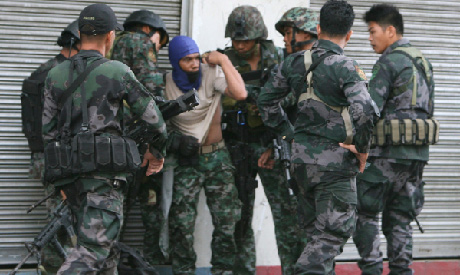
Soldiers check a comrade who was hit by a sniper following a clash between Philippine navy patrol and suspected Moro Islamic Liberation Front rebels aboard several boats off Zamboanga city in southern Philippines Monday, Sept. 9, 2013 (Photo: AP)
Muslim rebels launched an audacious assault in the southern Philippines on Monday, taking control of several villages and shutting down a major port in the biggest challenge to a peace deal signed by the government last year.
The attack by hundreds of heavily armed guerrillas on Zamboanga City highlights the fragility of the deal agreed last October with a larger rebel group to end four decades of conflict.
Transport officials suspended commercial flights and ferry services to the city of around 800,000. Schools, public offices and businesses were closed as gunfire rang out from clashes between soldiers and the estimated 200-300 invaders.
Six people were killed and 24 wounded as the rebels tried to force their way to the city center, Mayor Isabelle Climaco-Salazar said in a statement. About 3,000 people had fled their homes, she said.
Army commanders said the rebels landed in two coastal villages early on Monday and were trying to reach the city center to raise their flag over the city hall.
"They want to hoist their flag. We will not allow that," Colonel Andrelino Colina told a radio station.
Army spokesman Brigadier General Domingo Tutaan said about 200-300 people were "stranded" in a village occupied by the rebels. Officials had earlier said that dozens of civilians had been taken hostage.
"We condemn the attack on Zamboanga City in the strongest possible terms," Edwin Lacierda, spokesman for President Benigno Aquino, said in a statement. "The ongoing attack of armed individuals in Zamboanga City, including initial reports of the possible use of civilians as human shields, is a cause for great concern."
Aquino sent his defense and interior secretaries to Zamboanga after holding a security meeting to discuss the violence, among the worst in more than a decade in the conflict-torn south.
Security officials said the rebels belonged to a rogue faction of the Moro National Liberation Front (MNLF) separatist group, which entered into a peace agreement with government in 1996 and runs a Muslim autonomous region on southern Mindanao island.
Five years later, the faction led by former university professor Nur Misuari broke away, claiming the government had not fully implemented the deal. An army spokesman said that a known senior aide of Misuari, Ustadz Habier Malik, took part in Monday's attack.
Misuari opposed the deal signed last year by the Moro Islamic Liberation Front (MILF) in which the group agreed to a new autonomous region that would give the Muslim region greater political powers and more control over resources.
"They are trying to spoil the peace process," Mohagher Iqbal, MILF chief peace negotiator, told Reuters by telephone from the Malaysian capital Kuala Lumpur, where the latest round of talks is taking place.
Four decades of conflict in the south killed 120,000 people, displaced 2 million and stunted growth in the poor but resource-rich area of the mainly Catholic state. Last year's deal spurred hopes of an economic revival.
The rebel faction has yet to make formal demands and its leaders could not be reached for comment.
Emmanuel Fontanilla, a spokesman for the MNLF, called for a third party, like Muslim-majority Indonesia, to intervene and help end the standoff. Indonesia also brokered the peace agreement between the Philippines and MNLF in 1996.
Short link: